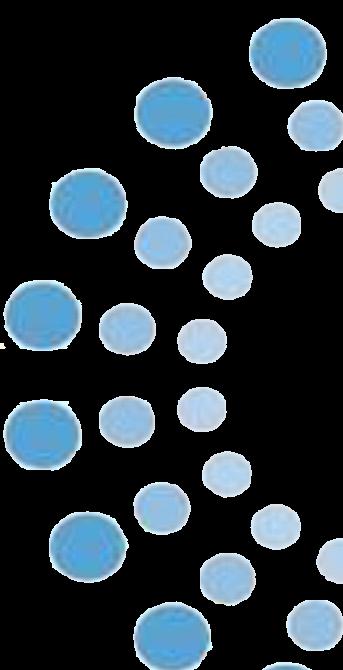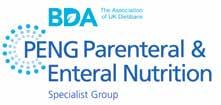
6 minute read
On behalf of PENG
Kate Hall, Communications Officer, Parenteral and Enteral Nutrition Group (PENG), a Specialist Group of the British Dietetic Association,
Anne Holdoway Chair, Parenteral and Enteral Nutrition Group (PENG), a Specialist Group of the British Dietetic Association,
Advertisement
PENG Clinical Update Course 26-29 June 2017. For more info
please visit:
www.peng. org.uk/clinicalupdate/
PENG CLINICAL UPDATE COURSE
Helping dietitians further master their skills in the safe and effective delivery of nutrition support.

There are few specialist groups who run Masters level study to help develop advanced practitioners; however, PENG believe that to future protect our profession post-graduate training and lifelong learning is essential. To assist those who have graduated to enhance their knowledge and skills whilst remaining in a clinical post, the PENG Clinical Update (now offered at Masters level) is an option to consider for dietitians wishing to specialise in nutrition support.
In this article, we aim to inform NHD readers, including those across the profession, those involved in nutrition support and members of other Specialist Group committees to reflect on why studying for a Masters in the workplace, facilitated by a specialist group and in conjunction with a higher educational institute, is of benefit to the individual on a professional basis but also the employing organisation.
The PENG Clinical Update Course in Enteral & Parenteral Nutrition has been run annually for Registered Dietitians since 1985. With regular feedback and evaluation, it has evolved to keep abreast of developments in the workplace and individuals’ educational needs.
In 1990, it was the first course to be validated by the British Dietetic Association. In 2010 it was accredited at Masters level by Queen Margaret University, Edinburgh. At the time of its inception, the aim of the course was to enable dietitians to consolidate and develop their knowledge of all aspects of artificial nutritional support. Today, 30 years on, the course has been updated in line with relevant current literature and the components are developed by experienced dietitians with encouragement and emphasis on the delegates’ use of critical appraisal to reflect and develop their own clinical practice. Whilst some of the course and personal studies are undertaken remotely, the one-week residential component provides delegates with the opportunity to share clinical experiences, develop practical skills and establish professional networks, the latter being helpful for longstanding peer support.
On successful completion, 15 Masters level credits are awarded from Queen Margaret University, Edinburgh.
The course commences every March, when pre-course work is sent out, and ends in September when the post-course assessment is submitted. There is a fourday residential element in June 2017.
WHEN IS THE BEST TIME TO DO THE PENG CLINICAL UPDATE COURSE? It is likely that you will only attend once during your career, hence PENG encourage all dietitians contemplating this course to consider the ideal time in your career to attend. Some clinical experience is essential before attending, as the baseline clinical knowledge gained in practice provides a firm foundation to maximise learning. The course is taught at Master’s level and meets the KSF requirement to demonstrate masterly knowledge in clinical nutrition support. If you are not ready for the Clinical Update Course you may wish to consider attending the BDA’s introductory study days on enteral and parenteral nutrition beforehand (www.bda.uk.com/calendar/) as a stepping stone before embarking on the Clinical Update Course.
We would always recommend discussing and planning your CPD requirements with your line manager or mentor, to help establish the level of learning to meet your individual requirements.
HOW IS THE PENG CLINICAL UPDATE COURSE STRUCTURED? The Clinical Update Course comprises a week-long residential component which provides a series of integrated lectures and workshops through which delegates and tutors explore clinical scenarios regarding nutritional assessment, interpretation of fluid and electrolyte status, estimating requirements, critical appraisal and enteral and parenteral nutrition. Independent study precedes the residential component and the course concludes with a Master’s level 15 credit module assessment.
Although, historically, PENG stipulated that delegates were required to have been qualified for two years in order that they would have sufficient clinical experience to gain maximum benefit and contribute to the workshop discussions, we have in recent years removed this application requirement and instead suggest consideration of the points outlined below to help decide timely attendance: • Do you have adequate clinical experience to be able to contribute to the workshop discussions? • Have you identified differences between your practice and those of your colleagues and would like to explore the latest evidence in a constructive environment? • Are you interested in improving your critical appraisal skills to improve your understanding and interpretation of research to further enhance your clinical practice? • Would you like to utilise your knowledge and evidence to formulate robust policies and procedures in your Trust? • Do you want to develop your anthropometric skills to perform a thorough nutritional assessment? • Are you struggling to assess and interpret fluid and electrolyte balance? • Do your patients experience complications of artificial nutrition and are you unsure of the best evidence-based practice to help them? • Are you keen to complete a Masters assignment in your clinical area and review the literature to support best practice?

WHAT NEXT? If you feel that the time is right for you to attend the course then we look forward to receiving your application and working together to help achieve best practice when providing artificial nutrition support for our patients.
Five lucky PENG members won a free place on the 2016 course: Rebecca Coates, Rebecca Halsall, Lisa Hughes, Frances Bayley, Maria Cole and they will be sharing their experiences in the autumn edition of e-PENlines and via the PENG website in due course. For more information on the course and dates visit www.peng.org.uk/clinical-update/
“I had a great week at the Queen Margaret University Campus for the PENG Clinical Update Course 2015. The course, itself, was informative, well presented and relevant to all aspects of nutrition support in both community and acute settings. All the tutors were very approachable and presented well researched, clinically relevant topics. The campus was an excellent venue. Accommodation onsite was comfortable with cooking facilities and en-suite rooms. The university staff were helpful and friendly.
The content of the lectures was excellent. Presented in a straightforward and easy-to-understand way. Every day had a clear set of topics with lecture and tutorials on each subject with practical workshops. This made absorption of the information easy and allowed discussion between us all. I learnt a lot from colleagues on the course working in different areas. We had community dietitians talking with ward dietitians and those who work on ITU. It was great to get a different perspective.
Day one focused on nutritional assessment and refeeding syndrome. On day two we discussed fluid and electrolyte management. We also had a very useful workshop on the statistics we would need to use for the post coursework.
I would recommend every dietitian to attend the PENG Clinical Update Course. The knowledge I gained has enriched my practice. It was also a great experience for networking. I met dietitians from all over the country that I have kept in contact with. As a lone working locum dietitian these connections are invaluable to me.” Roberta Forrester.






